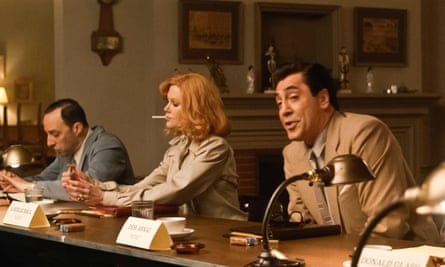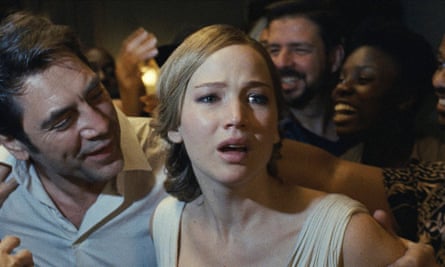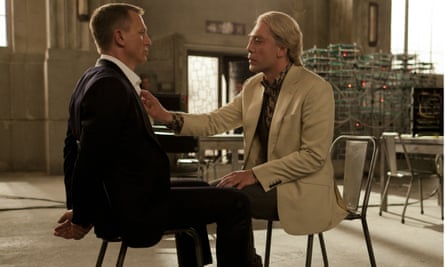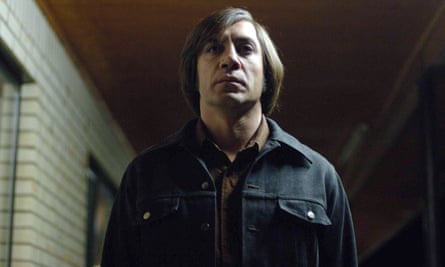The bad news is that, at the last minute, my interview with Javier Bardem is changed from being a face-to-face encounter to one conducted by the less risky means of video chat (damn you, Omicron!) But the good news is this means I get to snoop around Bardem’s home in Madrid, where he Zooms me from, and which he shares with his wife, the actor Penélope Cruz, and their two children, Leonardo, 10, and Luna, eight. OK, I don’t actually see the whole house, but he does give me a panoramic view of his study while his kids shout and play outside.
“You can see my little bookcase here,” Bardem says, picking up his laptop and giving me the grand tour. “And my map of the world. It’s very chaotic.”
It is very much not a fancy oak-lined library, but a space that looks closer to most people’s junk room. Boxes of old books and DVDs are waiting to be donated to a library, Fellini film posters are hung half-heartedly on the walls and a desk is piled with what can only be described as mishmash. Like everyone else on the planet, the Bardem-Cruz household spent lockdown clearing out their home.
Did he and Penélope dump all their couture Valentino dresses and Armani suits at the local charity shop? “No, we gave it to this church, where the priest indoctrinates with his own example, helping immigrants and people who have come out of jail. He made good use of the things we provided.”
So if you spot some especially well-dressed former convicts in Madrid, now you know why. Bardem, the first Spaniard to be nominated for a best actor Oscar (for the gorgeous Before Night Falls in 2000), and the first to win best supporting actor (for his terrifying performance in 2007’s No Country for Old Men), has the look of a man who is happily off-duty, in his reading glasses and rumpled T-shirt.
Unhappily for him, he has to talk to me about his newest film, the sparky Being the Ricardos, Aaron Sorkin’s biographical drama about the I Love Lucy stars Lucille Ball (played by Nicole Kidman) and her on- and off-screen husband, the Cuban bandleader and actor Desi Arnaz (Bardem). The film is good on the weirdness of Ball and Arnaz’s marriage, the two simulating a happy domestic life on air and living a more complicated one off it. Sorkin condenses the most tumultuous events of Ball’s life into a single week, including when the actor was questioned by the House Un-American Activities Committee about being a communist, and her husband’s infidelity was being splashed across the newspapers.
Arnaz fled to the US as a near-penniless teenager to become one of the biggest celebrities in the country. But Bardem does not underplay his weaknesses, namely for other women. “In 1930s Cuba, Desi was taught to constantly prove his male power, and that [machismo culture] is something I can relate to, for sure,” he says.

I Love Lucy ran from 1951 to 1957, and would often attract more than 40 million viewers a week in the US. Bardem, 52, grew up on the Canary Islands and was, at best, vaguely aware of it. But he watched and listened to all the recordings of Arnaz that he could find, and he fares better than Kidman in the film, who seems a little hemmed in doing an impersonation of Ball. Bardem is looser, and has more fun with the role, although he certainly took it seriously. Arnaz died in 1986 and every day before filming, Bardem would try to access his energy, “like a medium … I would say: ‘OK, I am here, if you want to come in and express yourself,’” he says. Just as I’m worrying we’re tipping in to thespy woo-woo territory, he laughs. “I didn’t do that when I played Pablo Escobar [in 2017’s Loving Pablo]. I didn’t want to invoke him at all!”
Some complained when Bardem, a Spaniard, was cast in the role of a Cuban, although there were no objections in the early 2000s when he played the Cuban writer Reinaldo Arenas in Before Night Falls. “It was a different time, right? But this is what actors do, we create other people’s lives. That can include origins or sexual orientation, accents and behaviours. I think we sometimes go too far in blocking the freedom of creativity by framing what an actor can and cannot do,” he says.
Sorkin recently compared the McCarthy era depicted in the film with the cancel culture era today. A possibly more fruitful parallel could be drawn between how Ball’s career was almost destroyed by a tabloid allegation – that she was a communist – and a popular tendency today to conflate allegations with proof. Bardem starred in Woody Allen’s 2008 film, Vicky Cristina Barcelona, and he has defended the director against repeat accusations that he is a child molester; Allen was cleared by two investigations in the 1990s.

“Pointing fingers at someone is very dangerous if it hasn’t been legally proven. Beyond that, it’s just gossip,” Bardem says.
Several actors worked with Allen over the past two decades, only to denounce him when the public mood turned against him. One such actor was Rebecca Hall, who co-starred with Bardem in Vicky Cristina Barcelona. Has he spoken to her about this? “No, I haven’t seen Rebecca in many, many years. To tell you the truth, I don’t follow any of that, what people said. I try to go where logic dictates, which is: let’s follow the rules that exist to establish whether someone is guilty or innocent. If the case re-opens and he is proven to be guilty, I will be the first to say: ‘What a horrible thing.’ But so far, I haven’t seen that.”
This summer, Bardem’s beloved mother, Pilar, died, and he mentions her often. “Every decision I make now, I think: ‘Would this make my mother proud?’ And if not, I immediately reject it. That’s a powerful legacy to leave, but she was a very powerful person,” he says.
She was, clearly, a helluva woman. A leftwing activist and celebrated actor in Spain known widely as “La Bardem”, Pilar divorced her husband when Bardem was three and later wrote in her memoirs that her ex-husband had a “violent will”. She raised her son and his two older siblings all on her own. “In 1960s Spain, it was a very hard time to be a woman, especially divorced with three kids and an actress. You were referred to as a prostitute,” he says.

Bardem was not a strong student – “I can’t be sitting for five hours; I’m sorry, I’m not that guy” – and he channelled his energy into rugby and painting, then eventually acting. He comes from a long line of Spanish actors and film-makers and recalls his mother saying: “If you’re going to dedicate yourself to this craft, respect it deeply for the surname you’re carrying.” By the age of 21, he was working with directors such as Pedro Almodóvar and Bigas Luna.
How would he feel if his kids wanted to be actors like their parents? He laughs. “Well, they’re very expressive and like to communicate, so it’s a possibility. I remember when Penélope was pregnant with Leonardo, we went out to dinner in New York after the premiere of Biutiful,” he says, referring to the 2010 Alejandro González Iñárritu film, for which he got his third Oscar nomination. “And God – otherwise known as Al Pacino – said hi to us and we asked him to bless the belly. I said: ‘I hope he’s not an actor’, and Pacino said, ‘Yeah, right.’ Then there was a silence and he looked at me and said smiling, ‘I hope he is.’”
Bardem and Cruz never talk about their private life, but as he has given me this inch, I grab a mile. The two fell in love while making Vicky Cristina Barcelona in 2007, but they had worked together before, in 1992 on Lunas’s Jamón Jamón. Did they have feelings for one another then?

“Of course we had feelings for each other, but we had feelings for everything that moved then! She was 16, I was 21, like, bags of hormones! It was the first time we went away to make a film, it was her first film. Life itself was opening in front of us. Then we went different routes and she did amazing things. So I guess those feelings were kept in a box until they were open,” he says.
Does he credit Allen with getting them together? “Of course we credit him. He reunited us – lots of credit!”
Did they invite him to their wedding? “No, no!” he laughs at the thought. “But I don’t think he would have come. I don’t know how sociable he is.”
Bardem has said that seeing his mother’s struggle to find work proved to him that an actor can never feel entirely secure in their job. Surely three Oscar nominations and a win has given him some sense of security?
“No! No, no, no, no! When I won the Oscar, I felt great, but it didn’t make any sense. It was more: ‘Wow, what is this? I need to earn this now so they don’t take it out of my hands!’”

Yet no one would argue he didn’t deserve it. His performance as Anton Chigurh, the unstoppable killer in the Coen Brothers’ No Country for Old Men, made him one of cinema’s great villains. That, plus his performance as the Bond baddie Raoul Silva in Skyfall means many audiences associate him with cruelty. Yet he loathes violence. Is that because of his father?
“No, no, it’s just that violence never helps, it only harms,” he says.
So playing bad guys must require an extra level of acting from him.
“Absolutely! But this goes back to what we were saying earlier. Making characters who are far from you … well, that’s what we do for a living.” Outside, though, the family is waiting. Making a living is all very well, but real life awaits.
Being the Ricardos in UK cinemas now and on Amazon Prime Video from 21 December.
